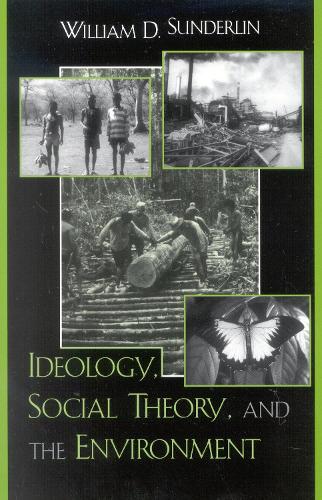
Ideology, Social Theory, and the Environment
(Paperback)
Publishing Details
Ideology, Social Theory, and the Environment
By (Author) William D. Sunderlin
Bloomsbury Publishing PLC
Rowman & Littlefield Publishers
11th November 2002
United States
Classifications
General
Non Fiction
Political science and theory
Environmentalist thought and ideology
320.01
Physical Properties
Paperback
256
Width 147mm, Height 229mm, Spine 15mm
354g
Description
This book shows that polemical environmental and ecological debates are governed not so much by access to facts as they are by the political ideology of the expert advancing a particular argument. Moreover, the thoughts of these experts tend to be based largely in just one of three competing streams of political thought: the left, the center, or the right. Drawing on social theory, the author explains the philosophical origins of this tendency to rely on just one of three traditions, and why this poses a serious obstacle to conceptualizing the cause, nature, and resolution of environmental problems.
Reviews
Sunderlin's new book shows how ideology influences the way people analyze our global environmental predicamentand often leads to unnecessary conflicts and confusion. An important and insightful book that will be valuable for both scholars and students. -- Michael L. Ross, Department of Political Science, UCLA
Sunderlin, in an encompassing sociological approach, covers at least three major debates that dominated the socio-scientific approach of environmental issues since they emerged from the late 1960s onwards: the question of whether Malthusian or rather Boserupian schemes of thought provide us the more adequate approach; the question of how to reconcile economic growth and Environment, and the question of how state, market and civil society interrelate in their contribution to solving environmental issues. -- Prof. Dr. Pieter Leroy, professor of political sciences of the environment at Nijmegen University, the Netherlands
William Sunderlin's exciting new book builds on a critical insightthat social and sociological views of the environment are largely ideologically anchored and drivenwhile steadfastly refusing to succumb to the relativistic notion that environmental reality is no more and no less than a matter of opinion or perspective. Ideology, Social Theory, and the Environment addresses the most central and enduring questions in environmental sociology: the ecological implications of the evolution of Western capitalism, the debate over Malthusianism, the possibilities for and limits to decoupling growth and environmental degradation, the future of environmentalism, and the meaning and implications of global environmental change. Sunderlin demonstrates elegantly that the environmental issues of the early twenty-first century can best be explored by reconsideringrather than jettisoningthe nineteenth century classical theory tradition. But while the social theories of Marx, Weber, and Durkheim remain highly relevant to understanding the world's environmental challenges, the gravity of these challenges is now pointing the way to the need for integration across the three paradigms that date from nineteenth century social thought. -- Frederick H. Buttel, professor of Rural Sociology and Environmental Studies, University of Wisconsin, Madison
Sunderlin's brilliant book shows us that ideology did not disappear along with the Berlin Wall. The ghosts of Marx, Weber, and Durkheim continue to haunt all the debate over the environment. Each has something to offer if we know how to listen, and this book gives us a guide. -- David Kaimowitz, Director General of the Center for International Forestry Research, Bogor, Indonesia
Suderlin develops [his arguments] clearly and systematically, while carefully avoiding overstating his case. The book was exhaustively researched and docmented....required reading for anyone trying to get a clear sense of the eates about environmental problems and what to do about them. * Development and Change *
Finally, a text that gives due regard to the ideological bases of environmental positions and conflicts without losing sight of their biophysical and historical roots. Better yet, the author doesn't settle for analyzing the conflicting perspectives he presents, he demonstrates why aspects of each of the ideological traditions are required if creative solutions are to be found for our environmental problems. This is a major contribution to the literature of sociology and social theory. -- Jack P. Manno, executive director, Great Lakes Research Consortium and author of Privileged Goods
Author Bio
William D. Sunderlin is a senior scientist for the Center for International Forestry Research (CIFOR).
